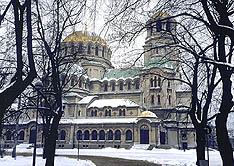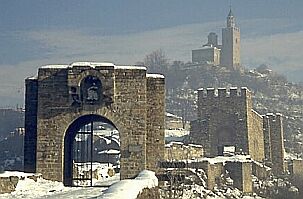|
|
|
|
On Christmas Eve, the whole family gathers at the table for their special feast. Everyone is expected to sit at the table before it gets dark outside. As part of the ritual, the father of the family moves through the house with incense while the family recites special prayers to drive away any evil spirits that may be lurking. Once the dining room is incensed, everyone takes their place at the table and no is supposed to stand up before the entire meal is finished. On the table there are 7, 9 or 11 dishes and all of them are vegetarian. The traditional dishes usually include: homemade bread, pumpkin pie, beans, cabbage leaves stuffed with rice, dried fruit compote, walnuts and garlic. In the bread there is a coin that is part of another Christmas ritual. The oldest member of the family takes three pieces of bread and sets them aside, one piece for the Christchild, one for Mary and the other for the household. He then breaks up the bread and gives a piece to everyone at the table. The person who finds the coin in his piece is expected to have good fortune during the coming year. The meal begins with garlic to insure good health for the coming year and that is followed by bread and honey to insure that the coming year will be sweet. The Christmas tree is usually purchased on December 23, and decorated that evening with the finishing touches added the next day. Straw is used for decorations to symbolize the straw in the stable at Bethlehem. Some place the straw on the table and cover it with a white cloth before placing the dinner plates on the table.  It's traditional for young men, called Koledari, to go from house to house singing seasonal carols wishing for good luck and good health. They are rewarded with food and, sometimes, money. Sooroovachka is a typical Christmas tradition in some areas of Bulgaria. This is something with which the children pat their parents, grandparents, extended family, friends and any visitors in the house with a special patting-stick. While patting, the youngsters say a wish for health, wealth, happiness and all the best to one patted. It is believed that this action called Sooroovakaneh will make all wishes come true during the next year and will make sure that the year will be very fertile and productive for the person patted. For the youngsters, the most important aspect of Sooroovakaneh is that the person patted usually gives the child some money -- a dollar or two. It is believed that this is the way you "buy" your success and productivity during the coming year. There are slight variations to the traditions from one area of the country to another. In some places, unmarried girls take their first piece of bread from the Christmas Eve meal and place it under their pillow. It is said that they will dream of their intended husband during the night. The Christmas Eve table is not cleared until the following morning. Once again, traditions vary in some areas regarding the reason. Some say that it is to insure that there will be plenty of food in the coming year, while others leave the food out for departed family members whose spirit may return. Still others leave the food on the table in case Joseph and Mary stop on their way to Bethlehem.  |